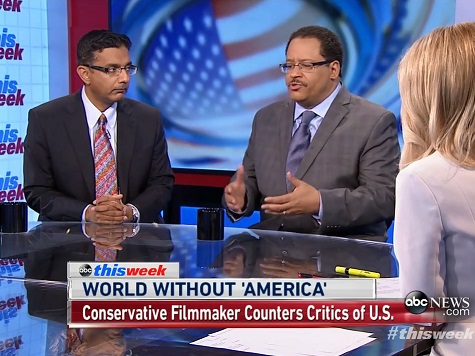To promote the recent launch of his movie “America,” filmmaker Dinesh D’Souza appeared in a debate with liberal Georgetown Professor Michael Eric Dyson on Sunday’s “This Week” on ABC to discuss the criticisms aimed at “America” and whether or not they were with merit or just an attack on the nation itself.
Transcript as follows:
RADDATZ: And Dinesh D’Souza joins us live, as well as Georgetown University professor, Michael Eric Dyson, who’s interviewed in the film. Welcome to both of you. Mr. D’Souza, let me start with you. The majority of this film seems to be a defense against those who question anything about this country’s history. Don’t you have to look back, especially at something like slavery, acknowledge what happened, before you can move forward?
D’SOUZA: Oh, absolutely. And, actually, in the beginning of the film, we have numerous critics of America, you included, Noam Chomsky, a Native American activist. And we lay out the case against America very passionately and without me making any defense. But I think that the film then turns around and address the critics and makes points that get neglected. So, for example…
RADDATZ: Pretty quickly, it moves on. I’ve watched it, as I told you…
D’SOUZA: Yes, it does.
RADDATZ: — I watched the entire film.
D’SOUZA: Well, it does…
RADDATZ: It moves on very quickly.
D’SOUZA: The reason is that the critique is so well known. In fact, it’s drummed into young people endlessly in schools and in colleges. What’s missing is the answer to it. So, for example, when Martin Luther King said I’m submitting a promissory note and I demand it be cashed, what was he talking about?
Actually, he was talking about “The Declaration of Independence.” So the reform movements in America to change things have not been breaks with the American founding, they have been returns to the American founding. So that’s what the film is. It’s a defense of the spirit of 1776, the same spirit that brought me to America as an immigration to live a kind of life unavailable elsewhere in the world.
DYSON: Well, look, to say that there’s not a discontinuity between Martin Luther King, Jr. and the larger American compact and — and project is absolutely right. The problem is, it’s not the left that said that. It’s not progressives that’s — that have made that claim, it’s people on the right. Now, they will make an exception for Martin Luther King, Jr., but those of us who are critics of the American state don’t believe that America is a nation doomed to its own — hoisting its on its own petard.
We’re saying that, look, if you love America, as James Baldwin said — he said I love America more than any other nation in this world, therefore, I reserve the right to criticize her relentlessly. And I think the point you began with is something that we should remember, that those who are critics of America don’t hate the nation, they love the nation. They want to love it into a better future.
Martin Luther King, Jr. said, the night before he was murdered, America, be true to what you said on paper. If the litmus test of authentic patriotism is the commitment to an ideal and a goal that furthers the conversation about all people participating equally, then that’s the kind of conversation that we have. He shouldn’t be demonized and others who succeed in his, you know, who are successors to him, should not be demonized for their questioning.
RADDATZ: — I — I want to move on, quickly, because we don’t have too much time on this. At the end of your film, you make a turn to politics more directly. And — and you essentially have a conspiracy theory about Hillary Clinton and Barack Obama turning this nation into a socialistic nation, something you said started when Hillary Clinton was in college.
D’SOUZA: Yes. It’s not a conspiracy theory, right here, a lot of people think that Hillary is like Bill. They go, well, we kind of want Billary back in the White House because — and the point we make in the film is, no, there’s actually a bridge connecting Hillary to Barack. And that bridge is Saul Alinsky.
Now, many of us develop our political ideas in our formative years. I was a young Reaganite in the early ’80s. Obama talks about standing at his father’s grave and having a sort of moment of revelation. Hillary met Saul Alinsky in high school. She brought him to Wellesley College. She wrote her thesis on him. So we’re not inventing a connection between Alinsky and Hillary, they’re — the connection is well-documented.
What we show in the film is rare footage of Alinsky…
RADDATZ: Professor — just quickly, we have about 30 more seconds.
DYSON: Well, here’s the reality. Yes, she has interpreted and interpolated Alinsky but she’s not given the suspicions of Mr. D’Souza, somebody who’s trying to bring down the American government. She’s trying to make that rare act of a politician in public, to bring ideas to bear upon the forces that prevailed that helped the nation become its best self and to work against the — the demons that are of the speaking, if you will, a negative impact on America.
So Alinsky, in terms of his impact on Obama and Hillary Clinton, I’m sure the Alinskyites would say it’s barely discernible now in their political lives.
RADDATZ: Thank you both.
Follow Jeff Poor on Twitter @jeff_poor

COMMENTS
Please let us know if you're having issues with commenting.